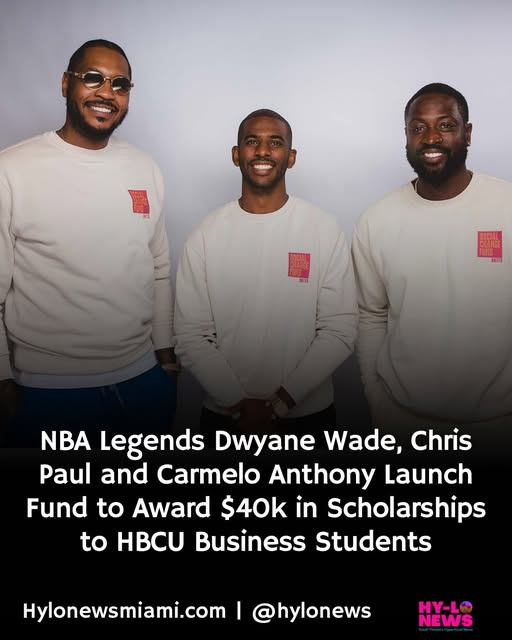Dwyane Wade has long been known for his prowess on the basketball court, dazzling fans with his agility, leadership, and relentless commitment to winning. But as time has gone on, the Miami Heat legend has increasingly become a force off the court as well—particularly in the realms of philanthropy, social justice, and education. In his latest move to make a meaningful impact, Wade has teamed up with two fellow NBA icons, Chris Paul and Carmelo Anthony, to champion educational equity through the Social Change Fund United (SCFU). Their most recent initiative: awarding \$40,000 in scholarships to students at Historically Black Colleges and Universities (HBCUs) who are pursuing degrees in business.
This act of generosity is more than a headline or a PR move. It’s a strategic and symbolic investment in the future of Black excellence, a reinforcement of belief in the power of education as a tool for empowerment, and a nod to the importance of HBCUs in shaping generations of Black leaders, thinkers, and change agents. While all three players have earned Hall of Fame-caliber respect for their on-court accomplishments, it is their off-court unity and vision that are increasingly cementing their legacies as changemakers.
HBCUs have historically played an outsized role in the advancement of African Americans in the United States, particularly in professions where they have been historically underrepresented or excluded. From lawyers and doctors to entrepreneurs and politicians, HBCUs have served as both safe havens and launch pads for excellence. Yet, despite their invaluable contribution, these institutions are often underfunded and overlooked in national education policy and philanthropy circles. This is why targeted support from high-profile figures like Wade, Paul, and Anthony carries both material and symbolic weight. It helps fill critical funding gaps, while also signaling to students that their ambitions matter and are worthy of national attention.
The decision to award scholarships specifically to business students is telling. In a society where economic power often translates into social and political power, nurturing a generation of Black business leaders is a direct challenge to systemic inequities. Black entrepreneurs, executives, and innovators often face unique barriers—limited access to capital, mentorship, and institutional support among them. By easing the financial burdens of college education for these future leaders, Wade, Paul, and Anthony are effectively investing in the infrastructure of Black economic empowerment.
Moreover, the scholarship initiative is a reflection of the broader mission of the Social Change Fund United, which was founded by the trio in 2020. The fund emerged during a time of social unrest and national reckoning over racial justice in America, following the murder of George Floyd. Since its inception, SCFU has sought to dismantle systemic racism and promote equity through investments in education, criminal justice reform, civic engagement, and economic empowerment. The organization is not merely about charity—it’s about structural change, policy influence, and long-term transformation.
What makes the efforts of Wade, Paul, and Anthony particularly compelling is their deep personal engagement with the causes they support. This is not a case of celebrities writing checks from a distance. Each of these athletes has consistently used his platform to advocate for equity, inclusion, and justice. Chris Paul, for instance, has been a vocal advocate for HBCUs for years. He’s not only spoken about them but has actively spotlighted their athletic programs and students, even helping to produce docuseries focused on their stories. Carmelo Anthony has consistently lent his voice and resources to social justice causes, and has also launched initiatives focused on criminal justice reform and youth development. Wade has been outspoken on issues ranging from LGBTQ+ rights to gun control and racial justice, using his personal experiences and family story to inspire advocacy.
Their collaboration through SCFU represents a collective acknowledgment that systemic change requires collective action. By pooling their resources, networks, and influence, these three men have created a mechanism that amplifies their individual efforts exponentially. Their scholarship program is one example of how strategic collaboration can yield tangible, life-changing results for young people.
For the recipients of these scholarships, the impact goes beyond the financial relief. It’s a statement of belief—an affirmation that they belong, that they are seen, and that their potential is worth investing in. College, particularly at the business level, is not just about acquiring knowledge. It’s also about developing confidence, building networks, and accessing opportunities that can shape one’s career and community impact. Knowing that legends like Wade, Paul, and Anthony are in their corner offers a kind of validation that’s both powerful and rare.
Furthermore, the visibility of this scholarship initiative has a ripple effect. It helps to reframe narratives about Black athletes and celebrities—countering reductive stereotypes that suggest their impact begins and ends with entertainment. It also challenges misconceptions about HBCUs, portraying them as fertile grounds for innovation, ambition, and excellence. As such, the initiative serves not only the students who receive the scholarships, but also the broader cultural conversation around education, race, and leadership in America.
Critically, this is not a one-off act of generosity. It fits into a broader pattern of sustained engagement. These athletes understand that real change is not episodic—it’s iterative. Scholarships today may become mentorships tomorrow. Grants may evolve into partnerships. Seed investments may bloom into full-fledged ecosystems of support. In that sense, the \$40,000 in scholarships is not an endpoint—it’s a beginning.
The initiative also reflects a growing trend in athlete activism, where sports figures are increasingly taking on the roles of philanthropists, investors, and community organizers. This new generation of athletes views social responsibility not as an extracurricular obligation, but as a core part of their brand and mission. They’re not waiting for retirement to start giving back—they’re doing it now, in real time, with the eyes of the world upon them.
In the case of Dwyane Wade, this commitment is especially resonant. Long known for his leadership on the court, Wade has emerged in retirement as a model of purpose-driven impact. Whether through his family advocacy, his investments in media and storytelling, or his philanthropic work, Wade consistently models what it means to use fame as a force for good. Teaming up with Paul and Anthony only deepens that impact, providing a blueprint for how collective athlete activism can shift realities for the next generation.
In a world often filled with performative gestures and superficial statements, the scholarship initiative spearheaded by these three NBA greats stands out as a substantive and heartfelt effort to level the playing field. It acknowledges both the historical challenges facing Black students and institutions, and the limitless potential that exists when those challenges are met with genuine support and belief. It’s a reminder that even as these athletes have hung up their jerseys, they continue to score—this time, for a better, more equitable future.
Ultimately, this story is about more than just basketball players giving away money. It’s about vision, courage, and commitment. It’s about recognizing that education is not just a pathway to personal success, but a catalyst for collective liberation. And it’s about proving that true greatness isn’t defined by stats or trophies, but by the lives you touch and the legacies you build.
In awarding \$40,000 in scholarships to HBCU business students, Dwyane Wade, Chris Paul, and Carmelo Anthony aren’t just changing lives—they’re changing the game.



